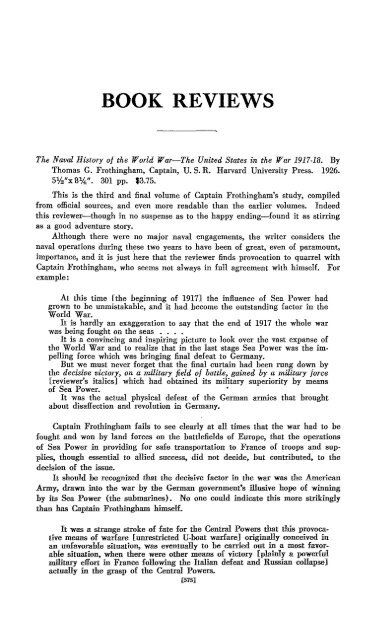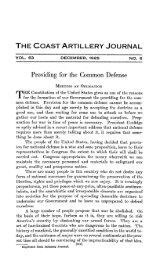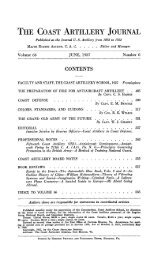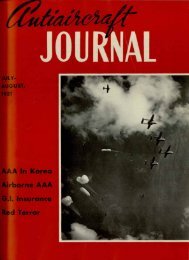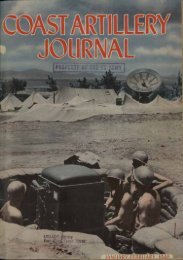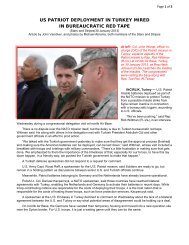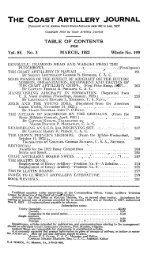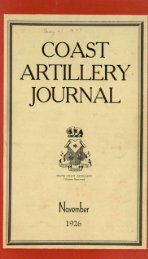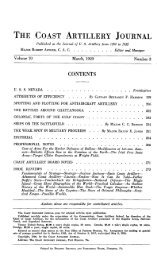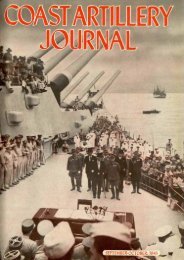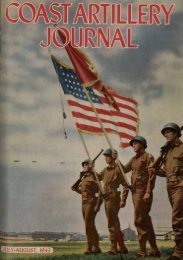COAST ARTILLERY, JOURNAL - Air Defense Artillery
COAST ARTILLERY, JOURNAL - Air Defense Artillery
COAST ARTILLERY, JOURNAL - Air Defense Artillery
You also want an ePaper? Increase the reach of your titles
YUMPU automatically turns print PDFs into web optimized ePapers that Google loves.
BOOK REVIEWS<br />
The Naval History of the World War-The United States in the War 1917-18. By<br />
Thomas G. Frothingham, Captain, U. S. R. Harvard University Press. 1926.<br />
5%/lx 8:14/1. 301 pp. $3.75.<br />
This is the third and final volume of Captain Frothingham's study, compiled<br />
from official sources, and even more readable than the earlier volumes. Indeed<br />
this reviewer-though in no suspense as to the happy ending-found it as stirring<br />
as a good adventure story.<br />
Although there were no major naval engagements, the writer considers the<br />
naval operations during these two years to have been of great, even of paramount,<br />
importance, and it is just here that the reviewer finds provocation to quarrel with<br />
Captain Frothingham, who seems not always in full agreement with himself. For<br />
example:<br />
At this time [the beginning of 1917] the influence of Sea Power had<br />
grown to be unmistakable, and it had become the outstanding factor in the<br />
World War.<br />
It is hardly an exaggeration to say that the end of 1917 the whole war<br />
was being fought on the seas ....<br />
It is a convincing and inspiring picture to look over the vast expanse of<br />
the World War and to realize that in the last stage Sea Power was the im.<br />
pelling force which was bringing final defeat to Germany.<br />
But we must never forget that the final curtain had been rung down by<br />
the decisive victory, on a military field of battle, gained by a military force<br />
[reviewer's italics] which had obtained its military superiority by means<br />
of Sea Power .•<br />
It was the actual physical defeat of the German armies that brought<br />
about disaffection and revolution in Germany.<br />
Captain Frothingham fails to see clearly at all times that the war had to be<br />
fought and won by land forces on the battlefields of Europe, that the operations<br />
of Sea Power in providing for safe transportation to France of troops and supplies,<br />
though essential to allied success, did not decide, but contributed, to the<br />
decision of the issue.<br />
It should be recognized that the decisive factor in the war was the American<br />
Army, drawn into the war by the German government's illusive hope of winning<br />
by its Sea Power (the submarines). No one could indicate this more strikingly<br />
than has Captain Frothingham himself.<br />
It was a strange stroke of fate for the Central Powers that this provocative<br />
means of warfare [unrestricted V-boat warfare] originally conceived in<br />
an unfavorable situation, was eventually to he carried out in a most favorable<br />
situation, when there were other means of victory [plainly a powerful<br />
militarY effort in France following the Italian defeat and Russian collapse]<br />
actually in the grasp of the Central Powers.<br />
[575]


